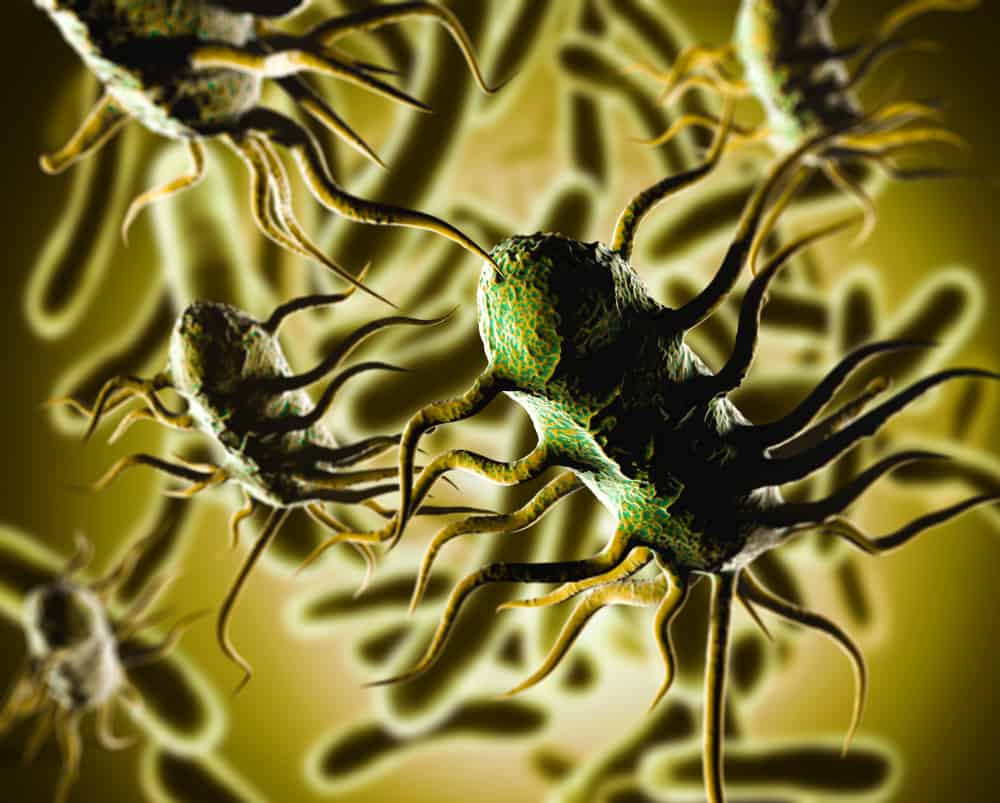You’ve probably heard it mentioned by healthcare professionals on the news. Pregnant women need to be very careful of what they eat. Not only is it that true because they have different nutritional requirements, but they also need to be wary of foodborne bacteria and pathogens, like listeria, which can greatly harm the baby.
The most important thing to know is that listeria is typically found in meat (though all foods can contain listeria), but it can usually be prevented by practicing proper hygiene in the kitchen. But knowledge is power, and by being fully aware of the dangers out there you can better protect both yourself and your baby, so this article will take a detailed look at what listeria is, how you get infected by this bacteria, how you can treat listeria during pregnancy and how you can prevent yourself from getting infected in the first place.
What Is Listeria?

Listeria is a foodborne bacteria that can cause serious illness amongst pregnant women, seniors over the age of 65 and immunocompromised individuals. This bacteria can survive refrigeration and freezing, and can be found in a wide array of contaminated food items. It can infect the brain, the spinal cord membranes or the bloodstream.
Although it is highly infectious, most pregnant women who are infected with listeria will present little to no symptoms of an infection. However, this bacteria can spread into and across the placenta to the fetus. Getting listeria during pregnancy can be devastating to the fetus. In fact, it often leads to severe health complications, and can even be fatal for the baby.
How Common Is Listeria During Pregnancy?
According to the Centers for Disease Control and Prevention (CDC), approximately 1,600 Americans get infected with listeria every year. This includes the general population, and not just pregnant women.
Of these 1,600 people, about 260 will die. Listeria is not that common during pregnancy compared to other infections, although pregnant women are 10 times more likely to get infected with listeria than non-pregnant women. With that said, it is definitely something that pregnant women should look out for due to the devastating consequences of an infection.
Foods That May Contain Listeria
The only way to get listeria is to eat contaminated food. Unfortunately, the types of foods that may contain listeria can be quite broad because listeria can spread easily. It’s most commonly found in meat and dairy, but it can be found in any food. Listeria transfers easily: if your meat is contaminated with listeria and stored too close to vegetables in your fridge, the vegetables may also become contaminated.
Some common foods that may contain listeria include:
- Deli meats
- Raw meat
- Raw vegetables
- Smoked seafood
- Unpasteurized dairy products
The good news is that listeria outbreaks are quite rare, and they don’t happen nearly as often as most people would think. To ensure that you’re not eating any contaminated foods, you should keep an eye out on the CDC’s map of reported listeria cases. If there is an outbreak in your area, you’ll find more information on the site.
Common Symptoms of Listeria During Pregnancy
The main issue with listeria during pregnancy is that it can be difficult to detect since many pregnant women will present little to no symptoms. In fact, sometimes, symptoms will develop up to two months after the infection. By that time, the bacteria will already have crossed the placenta and infected the baby.
Some common symptoms of listeria that may present in pregnant women mimic flu-like symptoms like:
- A fever over 100.6°F
- Chills
- Gastrointestinal symptoms, like diarrhea
- Headaches
- Muscle pain and aches
- Nausea
If listeria spreads to your central nervous system, you might also experience symptoms like a loss of balance, stiff neck, convulsions or confusion. The baby may not necessarily present any symptoms at all. However, they may die in the womb. If the baby is born with the infection, they may have little interest in feeding, exhibit irritability, have a fever, have difficulties breathing and may vomit regularly.
If you get infected with listeria during the first trimester, listeria has a fatality rate for the child of 20% to 30%. Early treatment can prevent further complications and fatalities.
Other Effects of Listeria During Pregnancy
Even if listeria doesn’t end up being fatal, it could have some devastating effects on the pregnancy. For example, it can lead to premature labor, low birth weight or developmental problems. Babies who were infected with listeria in the womb may have intellectual disabilities, be born blind, have impaired organs, experience seizures or be paralyzed. This bacteria can also cause meningitis and blood infections in newborns.
Tips for Preventing Listeria During Pregnancy

Because listeria can be so deadly for your baby, it’s important that you do as much as possible to prevent yourself from getting infected. The good news is that listeria infections are rare, so if you take the right precautions, the chances of getting infected are very low. Below, we’ve listed some quick tips that you can implement to prevent getting infected by listeria and other pathogens.
Wash Your Hands
Washing your hands often can help prevent listeria infections. Make sure that you know how to wash your hands properly. Many people rub some soap all over their hands and think they’re done; however, they’ve actually missed a lot of spots. Make sure that you get everything. You should wash your hands with antibacterial soap and warm water for at least 30 seconds just to be safe.
Use Separate Cutting Boards
When cooking a meal, it’s fairly common for most people to use one cutting board to cut up all of their ingredients. The issue with this is that you increase the risk of cross-contamination. Even if you’re planning on cooking all of the ingredients, it might be best if you use separate cutting boards for meat, vegetables, seafood and poultry.
Avoid Certain Foods
Certain foods will increase your exposure to listeria. These include deli meats, smoked seafood and unpasteurized dairy products, which include soft cheeses like brie, until after you’ve given birth. You should also try to avoid unpasteurized fresh fruit juice and veggie juice, too. In short, be mindful of what you consume and where your ingredients come from.
Wash Your Vegetables and Fruits
The lettuce for your salads or the organic fruits that you’ve picked up from the farmer’s market all have one thing in common: they need to be washed! Make sure that you wash all produce thoroughly under running tap water, especially if you’re planning on eating it raw.
Some pregnant women will avoid ready-to-eat salads, as they can’t be sure whether the salads have been properly washed. It might be better to make your own salads at home because you can be confident about whether the ingredients that are used are clean.
Clean Your Fridge Regularly
Clean your fridge regularly using soap or some type of disinfectant. Listeria can survive in the fridge, and if your vegetables are contaminated, this bacteria can easily cross-contaminate over to other foods that are in the fridge. By cleaning your fridge regularly, you’ll get rid of any lingering bacteria that may have made its way to the nooks and crannies.
On this same note, you should also keep your meats, vegetables, poultry and seafood away from each other. Make sure that you store leftovers in a sealed container and in a separate area as well.
Keep Your Fridge at an Ideal Temperature
Make sure that your refrigerator is set to a temperature lower than 40°F and that your freezer is set to lower than 0°F. Refrigerate leftovers as soon as possible and avoid letting them sit out in the open. You should thaw meat in the refrigerator and never out in the open on the counter.
Know When to Throw Out Old Ingredients
Read the expiration date on all food items that you purchase and know when to toss old ingredients out. You can keep refrigerated, uncooked eggs for up to three weeks before tossing them out. Watch out for brown spots on vegetables and try to keep fresh vegetables in the fridge for only 1 to 2 weeks at most. Only keep leftovers for 1 to 2 days. Anything longer than that, and you should toss the leftovers straight into the garbage bin.
Watch Out for Shady Restaurants
Do you have a food truck that you absolutely adore, but you’re not sure is super hygienic? Well, even if you’re craving something delicious from there when you’re pregnant, you should still try to stay away.
Watch out for signs that a restaurant might not follow basic sanitation guidelines and rules when you’re eating out. For example, take a look at how clean the kitchen (and the bathrooms!) may be. You also want to look out for flies, specks of dirt, bugs and rodents.
How Is Listeria Diagnosed?
To diagnose a listeria infection, a doctor will need to take a culture from a sterile site. Common samples include blood, amniotic fluid or spinal fluid. The most common scenario is that a pregnant woman will complain about getting frequent fevers. The doctor will take a blood culture to see whether there is any listeria present in the blood.
Fortunately, the lab tests can be completed within one to three days after the sample is received. If you have listeria, you and your doctor can act quickly to prevent this bacteria from affecting your baby.
How to Treat Listeria During Pregnancy

If you are infected with listeria during pregnancy, the doctors must act quickly to ensure that the bacteria does not affect the baby in any type of way. The way that healthcare professionals do this is by prescribing an antibiotic that can penetrate into the bacterial cell and kill it. This antibiotic must also cross the placental barrier, so that it can treat the infected baby as well.
Some of the most common antibiotics used to treat listeria during pregnancy include:
- Amoxicillin. This is essentially ampicillin with the difference that amoxicillin is given orally.
- Ampicillin. A dose of 6 grams or more per day of ampicillin is usually the go-to treatment method. Ampicillin is administered intravenously although it can also be administered orally.
- Penicillin. If the strain of listeria is resistant to ampicillin, penicillin is a suitable alternative.
- Trimethoprim/sulfamethoxazole (TMP/SMX). TMP/SMX is the most common antibiotic prescribed to patients who are allergic to penicillin. High doses are usually needed, and this drug is usually administered orally, although it can also be administered intravenously.
- Vancomycin. There is limited information on vancomycin use for treating listeria during pregnancy; however, it has been used successfully in several case reports against listerial meningitis and in listerial endocarditis. One of the main benefits of this antibiotic is that it is very rare for there to be any listerial resistance to this drug.
The antibiotic used will depend on many factors, such as whether there is any strain resistance and whether the patient is allergic to any of the drugs. Each patient will have a personalized treatment based on their needs.
Be Careful of What You Eat

The main takeaway should be this: be careful of what you eat when you’re pregnant because contaminated food items may contain listeria and other pathogens. Although listeria might not be fatal to you or cause you any major health complications, it can be fatal for your baby or it can result in some serious health complications down the road.
If you ever experience any flu-like symptoms or feel unwell, you should schedule an appointment with your healthcare professional to make sure that there isn’t anything that needs to be addressed immediately. You should also keep an eye out for news about outbreaks to make sure that you haven’t been exposed to listeria.
